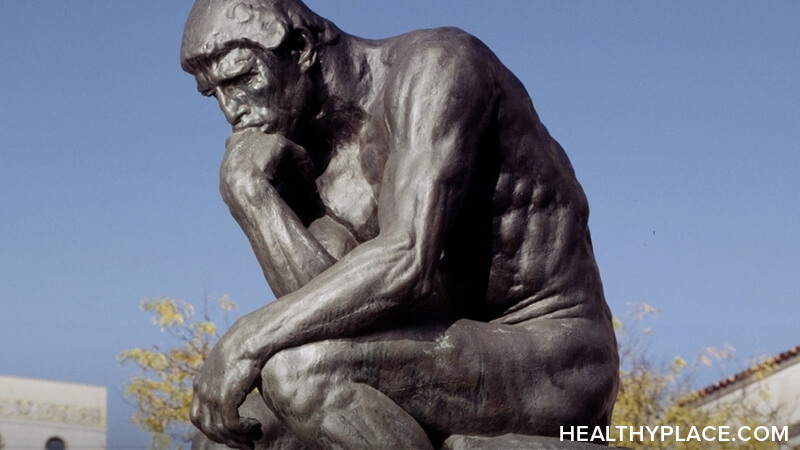Depression and Slow Thinking (Reduced Processing Speed)
Sometimes, when we're really stressed, our thoughts seem to race. The opposite of this – slow thinking – can happen when a person is depressed. You might notice when talking with a person who is depressed, they exhibit slow speech or difficulty understanding and registering information. It often feels, to the person who is depressed, as if it's very difficult to think and it takes more than the usual effort to do so. Sometimes, it's referred to as "brain fog."
It's important to note that while some depression medication side-effects may include slowed thinking (check your psychiatric medication side-effects), impaired processing speed has been shown to exist even without the presence of medication side-effects.

Depression and Slow Executive Thinking
Some of the slow thinking processes in depression are called "executive thinking skills." These are the skills required to plan, organize and problem-solve. They are more complicated forms of thought than others because they require you to act on a set of information.
For example, even if you know how to drive a car, driving to a friend's house is an executive thinking task because it involves planning when to go, ensuring the car has enough gas, mapping a route and changing that route should problems, like road construction, arise.
If you have depression, you may have slower executive thinking processing speed. So it is more difficult for you to come up with a plan as to how to cook a meal, drive to a location or hire an accountant and your thinking is also slowed if you have to find an alternative if your plan is blocked.
Pronounced deficits in executive thinking are present in approximately 20-30% of people with major depressive disorder. There are notable executive thinking deficits that also fall outside the realm of processing speed, specifically.
Research on Depressed Mood and Slow Thinking
In studies, it has been shown that people with depression think more slowly than others. For example, in a task where participants were asked to count backwards from one hundred by seven (100, 93, 86, etc.) people with depression were slower in doing so and made more mistakes.
It has also been noted that people with depression have more slowed thinking when dealing with negative emotional stimuli.
Depression may produce even greater slowed thinking in the elderly and in those with more severe depression symptoms or repeated depressive episodes.
Depression and reduced processing speed is even noted in people who are experiencing euthymia (a non-depressed, reasonably positive mood state). Additionally, some studies have noted that late-onset depression (people who experience their first depression in adulthood) may produce more pronounced cognitive processing speed deficits in euthymic patients.
Treatment for Slowed Thinking in Depression
Slow thinking in depression is not typically treated in and of itself, rather, the focus is on treating the depression as a whole. However, it has been shown that cognitive remediation (drills and exercises) can be effective at increasing cognitive speed (read: Treatment of Cognitive Deficits (Symptoms) in Depression).
APA Reference
Tracy, N.
(2021, December 30). Depression and Slow Thinking (Reduced Processing Speed), HealthyPlace. Retrieved
on 2026, March 4 from https://www.healthyplace.com/depression/symptoms/depression-and-slow-thinking-reduced-processing-speed



